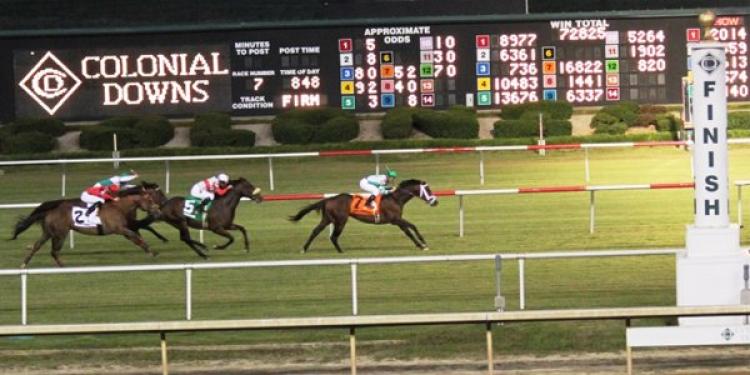Disagreements at Colonial Downs May Have Brought the End of Horse Racing in Virginia
Posted: October 18, 2014
Updated: June 4, 2017

The only racetrack in the Old Dominion and host of the annual Virginia Derby is scheduled to close on November 1.
Colonial Downs is about to shut down, owners have announced. The news has caused quite a stir, as people worry it might mean the end of horse racing in the state. To some, this might sound a bit too dramatic, but the truth is that this closure is certainly a major setback to Virginia’s thoroughbred horse-racing industry.
At the start of a meeting which brought together members of the Virginia Racing Commission in Richmond, the owner of the facility, Jeffrey Jacobs, decided to surrender the license that allowed him to operate the 17-year old track.
Despite knowing full well that Jacobs had been at odds with a group of thoroughbred owners and trainers, some of those present were caught off guard by his move. The dispute over the track’s race schedule had been going on since the beginning of the year and caused the track to miss its 2014 race season, which lead to the loss of thousands of dollars.
Buried by competition
Colonial Downs was home to the following graded stakes:
• Virginia Derby
• Colonial Turf Cup Stakes
• All Along Stakes
• Virginia Oaks
Economists have said Virginia was once “the center of racing during Colonial days.” In a statement posted on the Colonial Downs website and picked up by local gambling news, president Ian Stewart described the situation quite dramatically. The track “is now on life support,” he said.
There was no racing season this year at Virginia’s only track, because the owner and trainers started the year by arguing over the venue’s schedule. But industry experts say the problem is more complicated than that, and this minor conflict reflects much larger tensions the market is currently facing.
Horse racing has become less popular over the past few years, and those involved have been fighting over how to stop this decline. For Virginia, the situation is worse because the Old Dominion is facing competition from other states including Maryland, West Virginia and Pennsylvania.
All of these have boosted both the size of their budgets, and their funds for breeders with profits made from slot machines, but Virginia is one of nine states that still haven’t legalized gambling.
Struggling for profit
For a few years now, Colonial Downs has been hosting 30 days of racing spread over six weeks. “That model doesn’t work for the racetrack operator, who makes his money on big days,” Glenn Petty, former executive director of the Virginia Thoroughbred Association explained.
The operator of the racetrack makes most of his profit from larger events, such as the popular Virginia Derby, which is why Jacobs suggested the venue should host fewer, but more “higher-end” races. According to spokesman Jay Poole, he wanted events that have the potential to draw a larger audience, as well as nationally known horses and trainers.
Horse racing has lost its popularity in the US, which is why the sport has become harder to sustain financially. Under American gambling laws, Jacobs holds the license to operate the 17 year-old race track and for him fewer live races helps cut cost. But putting any new plans in action requires the operator to reach an agreement with the Horsemen’s Benevolent and Protective Association.
Frank Petramalo Jr., the association’s executive director explained that horse owners and trainers preferred to have a longer racing season, with a smaller budget and income. This way they get more chances to win purses, which they need to cover their costs. Keeping a thoroughbred in training costs an estimated $25,000 per year, Petramalo said.
The death of an industry
In 2013, both sides came close to a resolution. The state had even offered to pay for a professional mediator. A few weeks ago, Jacobs signed a deal with a newly-formed group and the commission was supposed to vote on the contract on Wednesday. This was until the man decided to surrender his license.
Todd Haymore, Secretary of Agriculture and Forestry and one of the people who were very much involved in finding a middle ground between the two sides, said he was “disappointed” at the decision, adding that it is important to sustain the industry.
According to a study by the Weldon Cooper Center for Public Service, the industry generated more than 16,000 jobs and produced almost 1,200 events which brought the state $25 million in revenue. But this was back in 2010 and things have changed.
Closing the race track will also bring down the seven off-track betting sites in Virginia, where people were able to place wagers on horse races. It will also hurt New Kent County, the home of Colonial Downs.
“The end of Virginia racing”
New Kent had to deal with a $400,000 budget shortfall this year, due to the track’s inactivity. Thomas W. Evelyn, chairman of the board of supervisors said the situation caused the cancellation of elementary summer school. The county was also unable to hire additional teachers and emergency responders. Moreover, the property’s value will most likely drop without a racing permit.
Evelyn expects a potential shortfall of up to $1 million in tax revenues. “Our budget is already on a shoestring. A million shortfall — I can’t foresee us not having some kind of tax increase or budget cuts,” he predicted.
“It’s the end of Virginia racing,” said trainer Speedy Smithwick. But Dawson believes this is just “a pause” and said that the thoroughbred community “is very determined” and will probably “surmount it.”
There is a chance that thoroughbred races will be held as part of steeplechase events, including the Gold Cup which will take place later this month.












